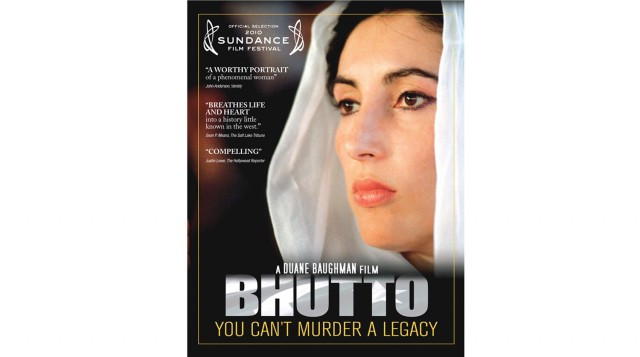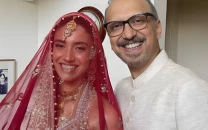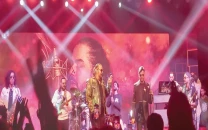Bhutto is compelling, but offers nothing new

Curiosity about the Bhuttos is something that several books, dozens of television programmes and specials, investigative print reports and hundreds of interviews have not been able to quell.
It is on this wave that the highly awaited documentary, Bhutto, releases. First shown at the Sundance Film Festival earlier this year, the documentary is a must-watch, but not because it offers anything new in terms of information. It is voiced largely by Benazir Bhutto through a never-before released audio tape as she recites her own history (largely the same as the version she wrote in Daughter of the East).
But it is meant for an audience that is unfamiliar with the Bhuttos and with Pakistan. Instead of providing an in-depth look at who she was or even her political career, Bhutto offers a concise, narrow perspective of Pakistani history from Partition to Benazir’s death, relying on sharp infographics to introduce the viewer to Pakistan and placing Benazir in that context.
It opens with the infamous David Frost interview that Benazir gave shortly after her return to Pakistan in 2007, segues into the assassination attempt on her life in Karachi and then delves into Pakistan’s conception.
The documentary then showcases Benazir’s life through interviews with her friends and family, a part that shows some new images of Benazir highlighting her evolution from a woman who had been exposed to ideals from the wave of opposition to the Vietnam War to a woman who surprised all her friends by agreeing to an arranged marriage.
Bhutto also plays to the gallery and the current climate and focus on the region. The narrative of the documentary builds up to show how Benazir spoke out about the dangers of militancy. Siegel says Benazir told former US President George Bush that “I feel we have created a Frankenstein.” The narrative builds up to show how her history with the military and militants played a role in her death.
The number of people interviewed for Bhutto is extensive, even if their soundbytes barely feature any criticism of her. Interviewees include Victoria Schofield, Christina Lamb, Reza Aslan, Tariq Ali, Steve Coll, Arianna Huffington, Shuja Nawaz, current and former ambassadors Husain Haqqani, Akbar Ahmed and Wajid Shamsul Hasan, Peter Galbraith, Mark Siegel, former US Secretary of State Condolezza Rice and former President Pervez Musharraf. The Bhutto family is also interviewed, including President Asif Ali Zardari, Bakhtawar, Asifa and Bilawal Bhutto-Zardari, Sanam and Fatima Bhutto and Benazir’s uncle Ahmad Ispahani.
Unfortunately, for a Pakistani audience, beyond the images and new footage, Bhutto offers nothing new and often feels like a product of the Pakistan Peoples Party’s PR machine.
The few fleeting moments that offer an insight into Benazir are powerful, such as when Mark Siegel describes that Benazir had to do paid speaking tours so she could support her family and often cried in private, her children how she single-handedly raised them, Ahmed Ispahani on how Benazir was simply unable to talk after spending time in solitary confinement.
The witticisms that her friends repeat Benazir saying or the anecdotes they share from her time at Harvard, Oxford and on every campaign trail, are what would have made for a far more compelling narrative than the rehashed account of why and how Benazir died.
Bhutto opens in selected cinemas in Karachi, Lahore and Rawalpindi on Friday, June 11.
Published in the Express Tribune, June 11th, 2010.


















COMMENTS
Comments are moderated and generally will be posted if they are on-topic and not abusive.
For more information, please see our Comments FAQ